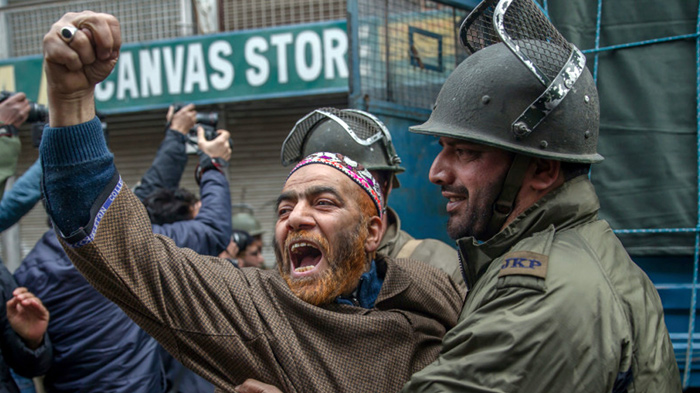Towards Annexation and Indianization of Kashmir in Broad Daylight is a 38-page report by Sabur Ali Sayyid, published by the Kashmir Institute of International Relations, containing a detailed analysis of the post-August 2019 developments. India abrogated Articles 370 and 35A of its Constitution, which promised autonomy to the Indian Occupied Kashmir (IOK). Besides, the report offers 11 valuable recommendations to counter the Indian move at local, national and international levels. The report argues that the revocation of the above-mentioned articles is not merely a constitutional change but a well-designed plan to change the socio-political and economic landscape of the IOK.
Articles 370 and 35A granted the people of Kashmir autonomy, a constitution, a regional flag and legislative power. The abrogation of these articles invited massive public criticism and protests from across the political divide, so much so that all means of communications were shut down. For months, internet services were suspended to prevent the citizens’ reaction to be known widely. Many international organisations called this an internet apartheid. The policy stirred significant global censure.
The report discusses the recently inducted 200 laws, clearly intended to obliterate Kashmir’s historic identity and the diverse makeup of its population. For instance, the recently inducted domicile law has given 3.2 million Indian citizens residential rights in the region. This is a blatant violation of the relevant articles of the Fourth Geneva Convention, which prevents occupational force/country from settling its citizens in occupied territory.
In this context, India has brought forth several administrative, economic, and political developments to alter the ground realities in the IOK. The constitutional change can be traced back Bharatiya Jan Sangh’s (BJP’s parent organization) demand for a “complete integration” of Kashmir with India.
The report states that after the abrogation of the articles, India is embedding a settler plan all over the region. Large-scale killings and human rights violations by the Indian forces are happening in the IOK. India is also attempting to rapidly replace all the Kashmiri officials at the top administrative positions with Indians. The mining industry in the region has already been taken over by the Indians. The report also highlights the new laws made by the Indian government aimed at burying Kashmir’s history and culture, such as the decision to replace Urdu with Hindi as one of the official languages of the IOK. Taran Chugh, the BJP secretary, has expressed his satisfaction in this regard by saying, “the best thing is that Urdu will no longer be the first and official language of the state.”
Pro-India parties in the IoK came out together to restore the internal autonomy of the IOK. Their victory in the district development council (DDC), after the abrogation of IOK’s special status, proved that the Kashmiris strongly reject New Delhi’s decision to revoke the articles.
Talking about Pakistan’s reaction to the post-August 5, 2019 situation, the report says Pakistan was caught by surprise by India’s decision. However, it promised to stand by the Kashmiris through thick and thin. The country sent back the Indian High Commissioner and called back his counterpart from New Delhi. The bilateral trade was also suspended, and a new Political Map of the country was introduced that included the IOK. Prime Minster Imran Khan and Foreign Minister Shah Mahmood Qureshi held meetings with several world leaders at various occasions, including the United Nations General Assembly session, and explained the situation in the IOK.
As a result of Pakistan’s efforts, the UN Security Council took up the Kashmir issue three times in its closed-door sessions and expressed concern over its current status. A joint statement was issued by 58 countries at the UN Human Rights Council, condemning India’s action. US President Joe Biden, Vice President Kamala Harris and several US Congress members voiced concern regarding the human rights situation in India during their presidential campaigns.
This report is a valuable addition to the literature on post-August 5, 2019 situation in the IOK.
The writer is a Rawalakot, AJK, based freelance contributor. She can be reached at hunainmehmud101 @gmail.com

